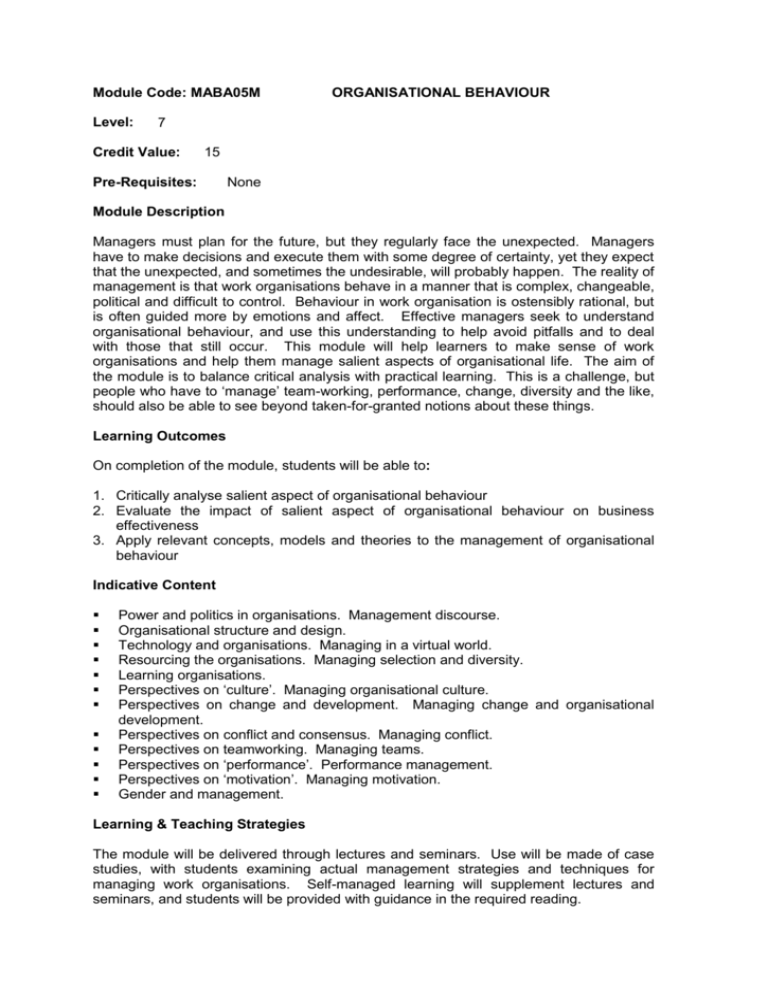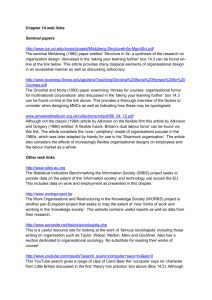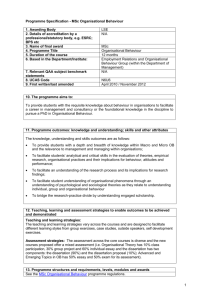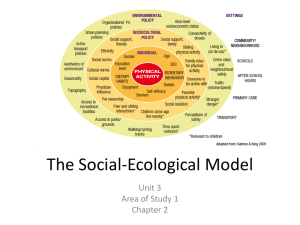Module Code: MABA05M ORGANISATIONAL BEHAVIOUR Level: 7
advertisement

Module Code: MABA05M Level: ORGANISATIONAL BEHAVIOUR 7 Credit Value: 15 Pre-Requisites: None Module Description Managers must plan for the future, but they regularly face the unexpected. Managers have to make decisions and execute them with some degree of certainty, yet they expect that the unexpected, and sometimes the undesirable, will probably happen. The reality of management is that work organisations behave in a manner that is complex, changeable, political and difficult to control. Behaviour in work organisation is ostensibly rational, but is often guided more by emotions and affect. Effective managers seek to understand organisational behaviour, and use this understanding to help avoid pitfalls and to deal with those that still occur. This module will help learners to make sense of work organisations and help them manage salient aspects of organisational life. The aim of the module is to balance critical analysis with practical learning. This is a challenge, but people who have to ‘manage’ team-working, performance, change, diversity and the like, should also be able to see beyond taken-for-granted notions about these things. Learning Outcomes On completion of the module, students will be able to: 1. Critically analyse salient aspect of organisational behaviour 2. Evaluate the impact of salient aspect of organisational behaviour on business effectiveness 3. Apply relevant concepts, models and theories to the management of organisational behaviour Indicative Content Power and politics in organisations. Management discourse. Organisational structure and design. Technology and organisations. Managing in a virtual world. Resourcing the organisations. Managing selection and diversity. Learning organisations. Perspectives on ‘culture’. Managing organisational culture. Perspectives on change and development. Managing change and organisational development. Perspectives on conflict and consensus. Managing conflict. Perspectives on teamworking. Managing teams. Perspectives on ‘performance’. Performance management. Perspectives on ‘motivation’. Managing motivation. Gender and management. Learning & Teaching Strategies The module will be delivered through lectures and seminars. Use will be made of case studies, with students examining actual management strategies and techniques for managing work organisations. Self-managed learning will supplement lectures and seminars, and students will be provided with guidance in the required reading. Assessment A 3,500 word report Bibliography Highly Recommended( Bratton, J. et al (2010) Work and Organisational Behaviour, 2nd ed., Palgrave: Basingstoke Rollinson, D. (2008) Organisational Analysis & Behaviour: An Integrated Approach, 4th ed, FT Prentice Hall: Harlow Recommended: Brooks, I. (2009) Organisational Behaviour: Individuals, Groups and Organisation, 4th ed., FT/Prentice Hall Harlow Buchanan, D. & Huczynski, A. (2006) Organisational Behaviour: An Introductory Text, 6th ed. FT/Prentice Hall; Harlow Burnes. B (2009), Managing Change, 5th ed., FT Prentice Hall; Harlow Carnall, C. (2003), Managing Change in Organisations 4th ed. FT Prentice Hall; Harlow Fineman, S., Gabriel, Y. & Sims, D. (2005) Organising and Organisations, Sage Jackson, N. & Carter, P. (2007) Rethinking Organisational Behaviour (2nd ed) FT Press Linstead, S., Fulop, L. & Lilley, S. (2004) Management and Organisation: A Critical Text, Palgrave: Basingstoke Martin, J. (2005) Organisational Behaviour & Management 3rd ed., Thomson McKenna, E. (2006) Business Psychology and Organisational Behaviour 3rd ed.,Psychology Press Morgan, G. (2006) Images of Organization, 4th Ed. Sage Mullins, L. (2007), Management & Organisational Behaviour 8th ed. FT Prentice Hall; Harlow Robbins, S. & Judge, T. (2006) Organisational Behaviour Prentice Hall; HArlow Background Reading Darwin, J., Johnson, P. & McAuley, J. (2002) Developing Strategies for Change FT/Prentice Hall Dick, P. & Ellis, S (2005) Introduction to Organisational Behaviour, McGraw Hill Fineman, S. (2003) Understanding Emotion at Work, Sage In addition: Quality newspapers (e.g. Financial Times, Times, Independent, Guardian, Economist, etc.) Appropriate academic journals (e.g. Harvard Business Review, Leadership Quarterly, Organisational Dynamics)








